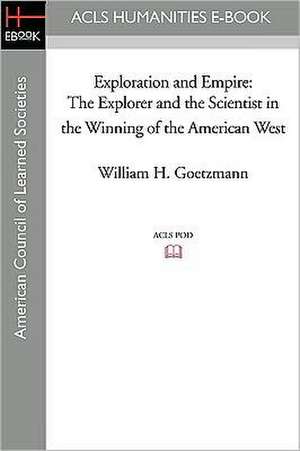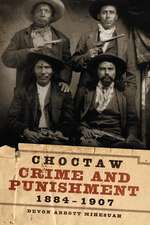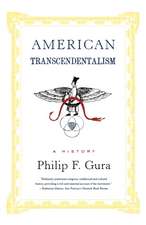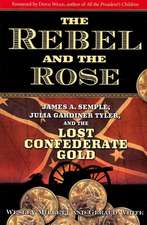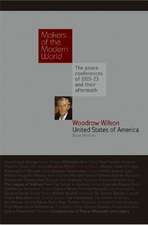Exploration and Empire: The Explorer and the Scientist in the Winning of the American West
Autor William H. Goetzmannen Limba Engleză Paperback – 31 oct 2008
| Toate formatele și edițiile | Preț | Express |
|---|---|---|
| Paperback (1) | 494.29 lei 6-8 săpt. | |
| ACLS HISTORY E BOOK PROJECT – 31 oct 2008 | 494.29 lei 6-8 săpt. | |
| Hardback (1) | 547.59 lei 6-8 săpt. | |
| ACLS HISTORY E BOOK PROJECT – 30 iun 2010 | 547.59 lei 6-8 săpt. |
Preț: 494.29 lei
Preț vechi: 641.94 lei
-23% Nou
Puncte Express: 741
Preț estimativ în valută:
94.58€ • 103.06$ • 79.70£
94.58€ • 103.06$ • 79.70£
Carte tipărită la comandă
Livrare economică 23 aprilie-07 mai
Preluare comenzi: 021 569.72.76
Specificații
ISBN-13: 9781597404266
ISBN-10: 1597404268
Pagini: 702
Dimensiuni: 152 x 229 x 36 mm
Greutate: 0.92 kg
Editura: ACLS HISTORY E BOOK PROJECT
ISBN-10: 1597404268
Pagini: 702
Dimensiuni: 152 x 229 x 36 mm
Greutate: 0.92 kg
Editura: ACLS HISTORY E BOOK PROJECT
Textul de pe ultima copertă
From early mountain men searching for routes through the Rockies to West Point soldier-engineers conducting topographical expeditions, the exploration of the American West mirrored the development of a fledgling nation. In his Pulitzer Prize-winning Exploration and Empire, William H. Goetzmann analyzes the special role the explorer played in shaping the vast region once called "the Great American Desert". According to Goetzmann, the exploration of the West was not a haphazard series of discoveries, but a planned - even programmed - activity in which explorers, often armed with instructions from the federal government, gathered information that would support national goals for the new lands. As national needs and the frontier's image changed, the West itself was rediscovered by successive generations of explorers, a process that in turn helped shape its culture. Nineteenth-century western exploration, Goetzmann writes, can be divided into three stages. The first, beginning with the Lewis and Clark expedition in 1804, was marked by the need to collect practical information, such as the locations of the best transportation routes through the wilderness. Then came the era of settlement and investment - the drive to fulfill the Manifest Destiny of a nation beginning to realize what immense riches lay beyond the Mississippi. The final stage involved a search for knowledge of a different kind, as botanists and paleontologists, ethnographers and engineers hunted intensively for scientific information in the "frontier laboratory". This last phase also saw a rethinking of the West's place in the national scheme; it was a time of nascent conservation movements and public policy discussions aboutthe region's future. Drawing on a wealth of primary sources, Goetzmann offers a masterful overview of the opening of the West, as well as a fascinating study of the nature of exploration and its consequences for civilization.
